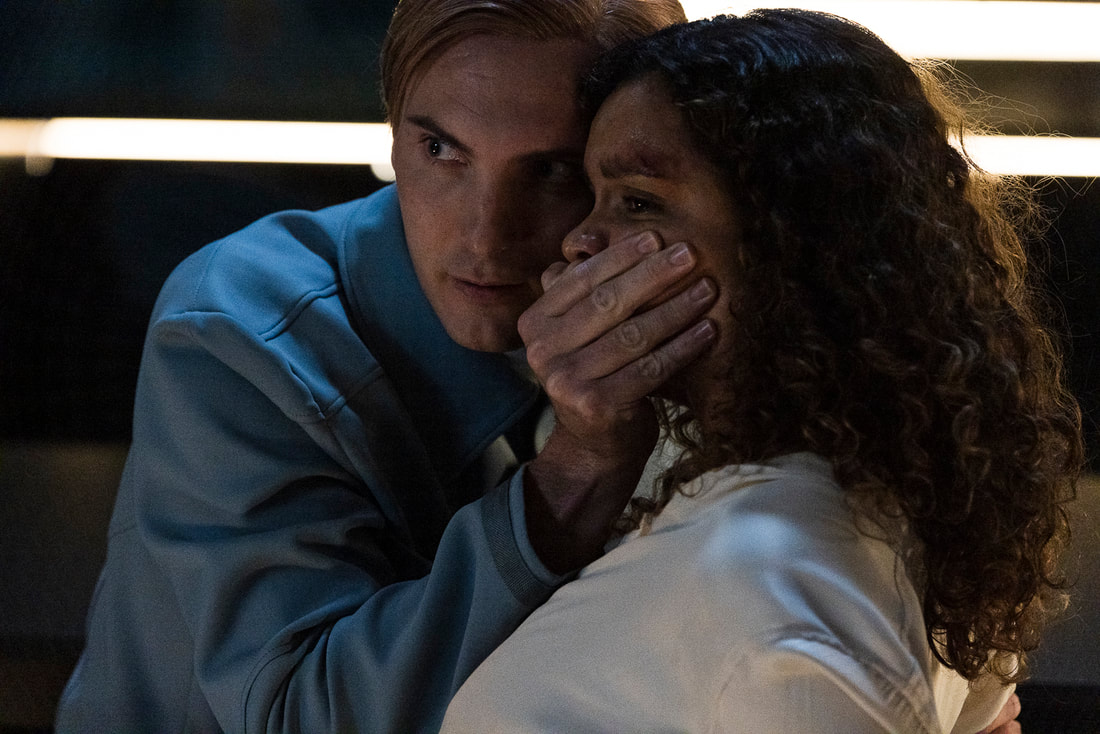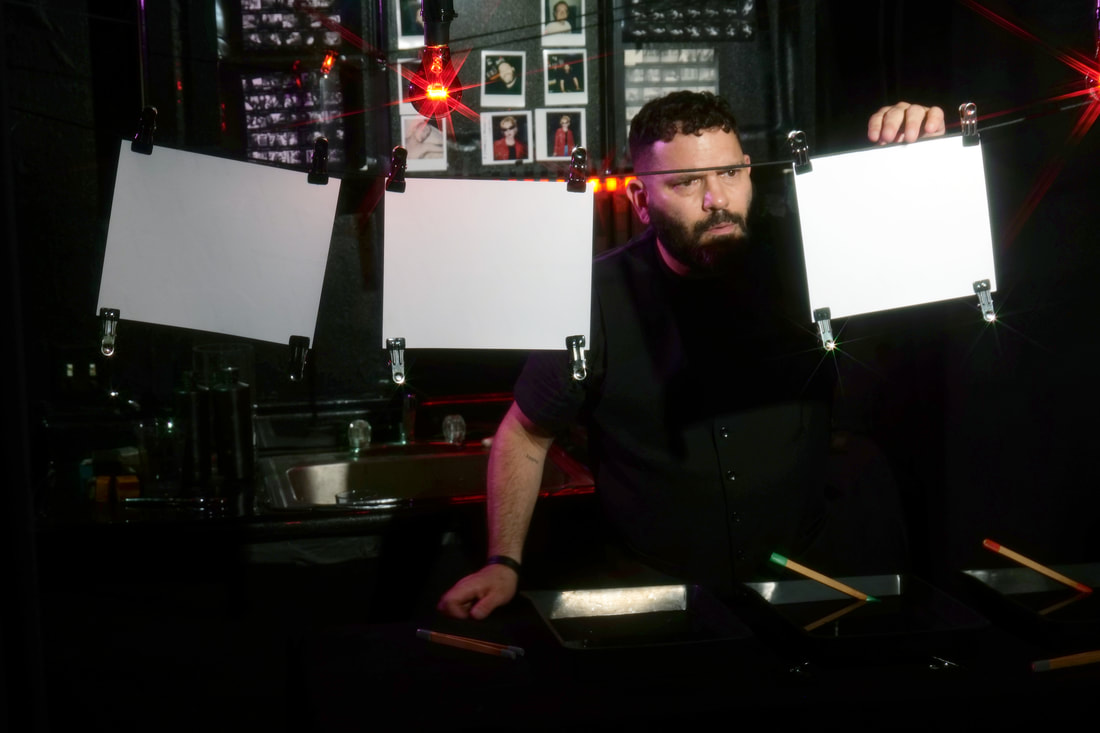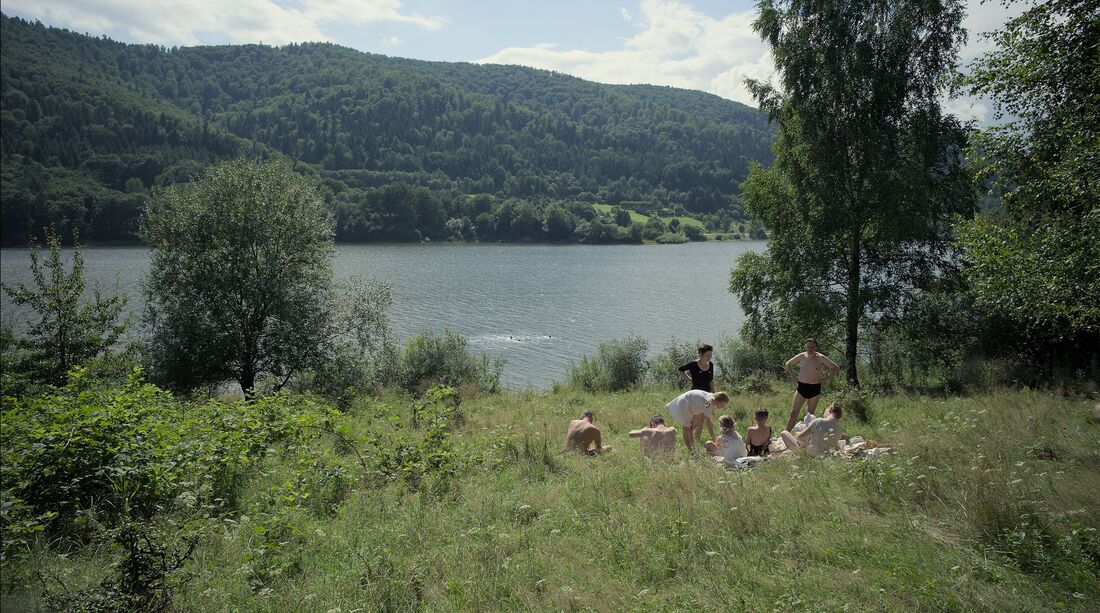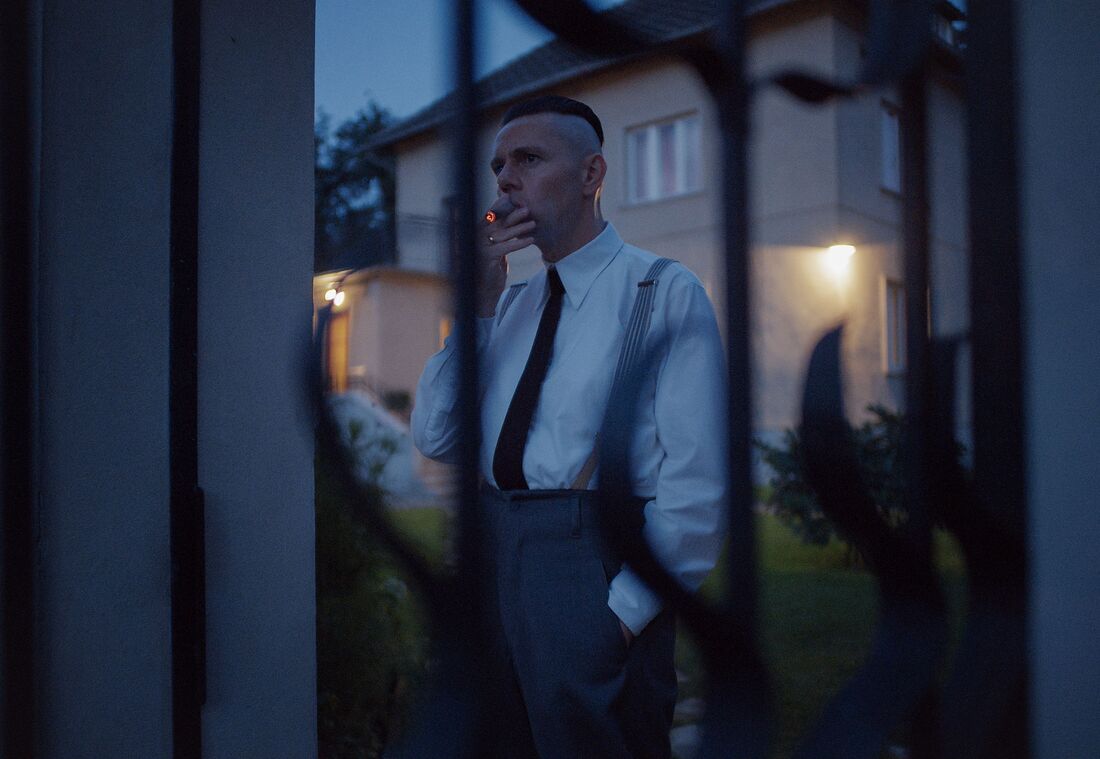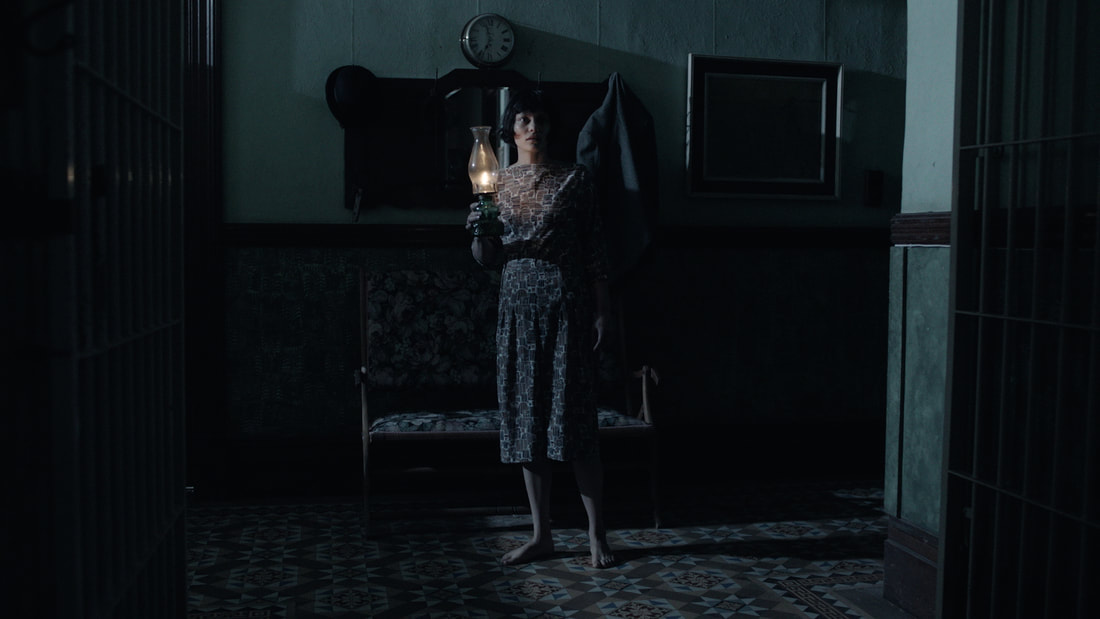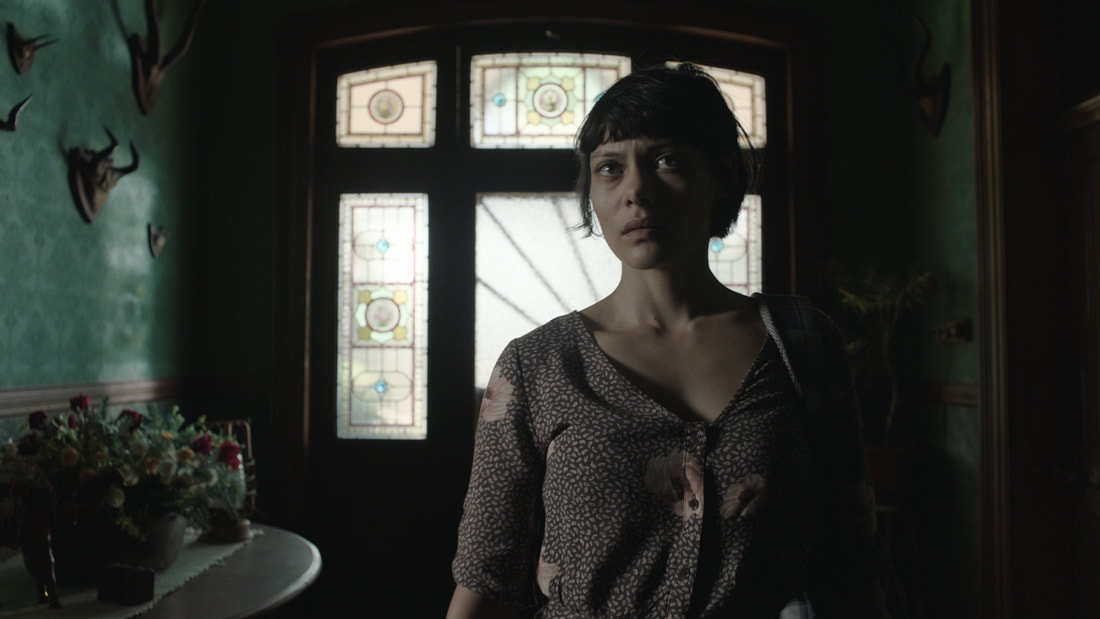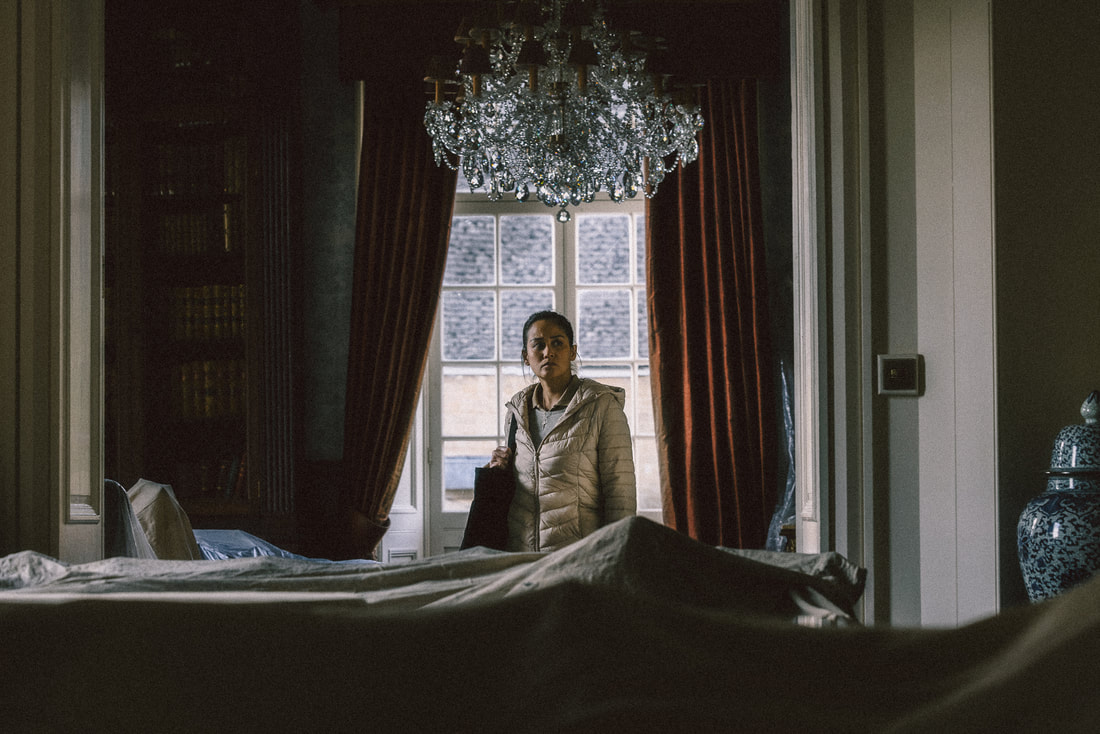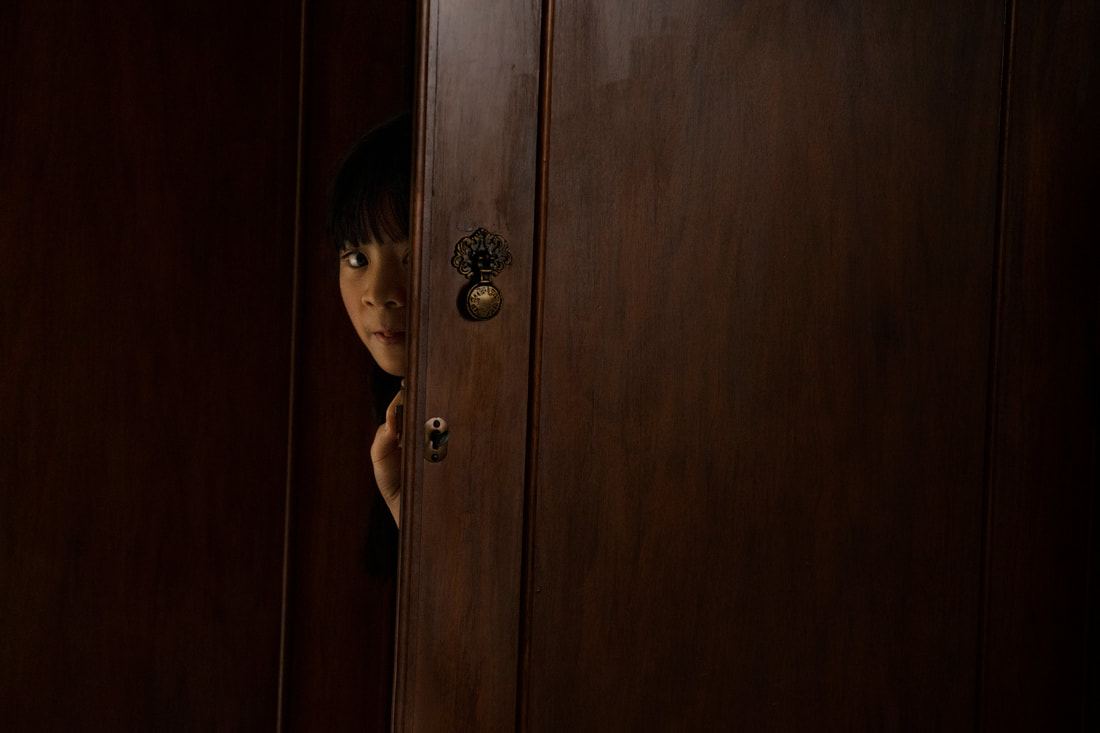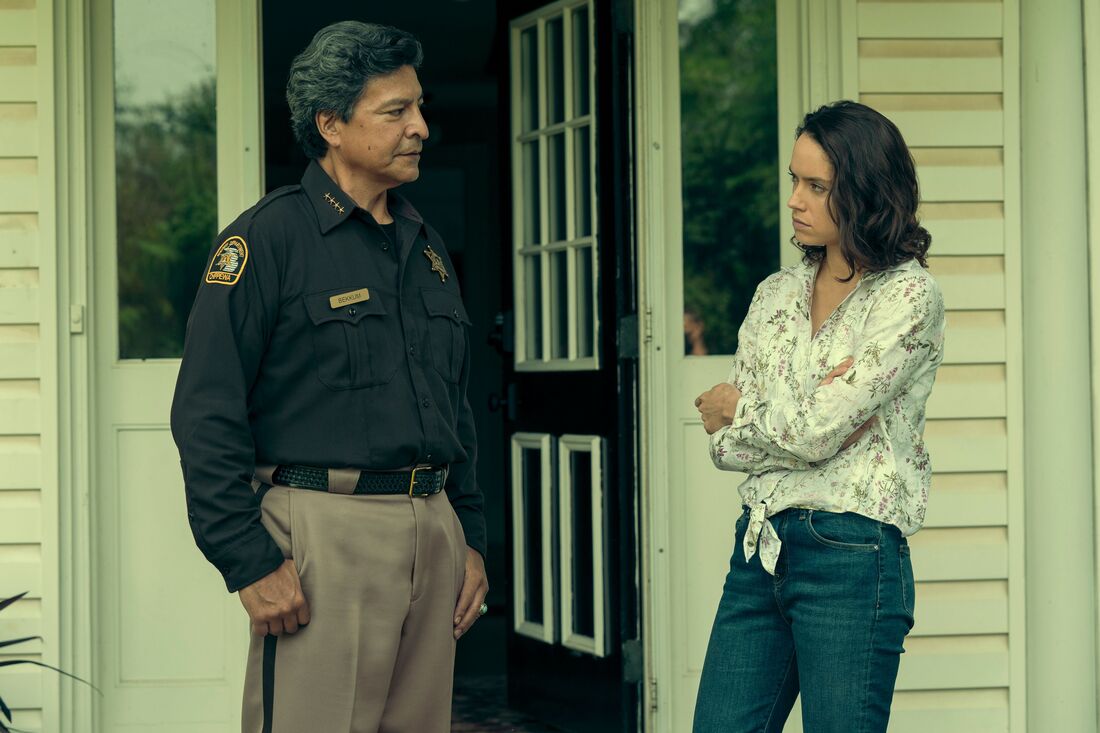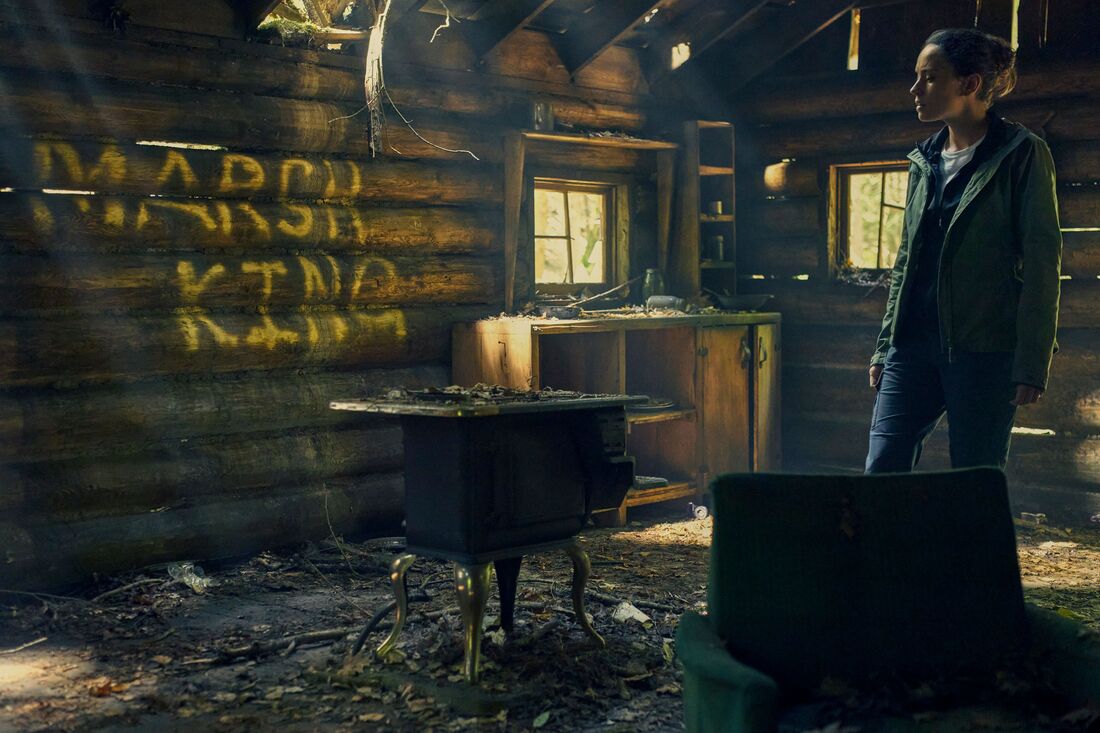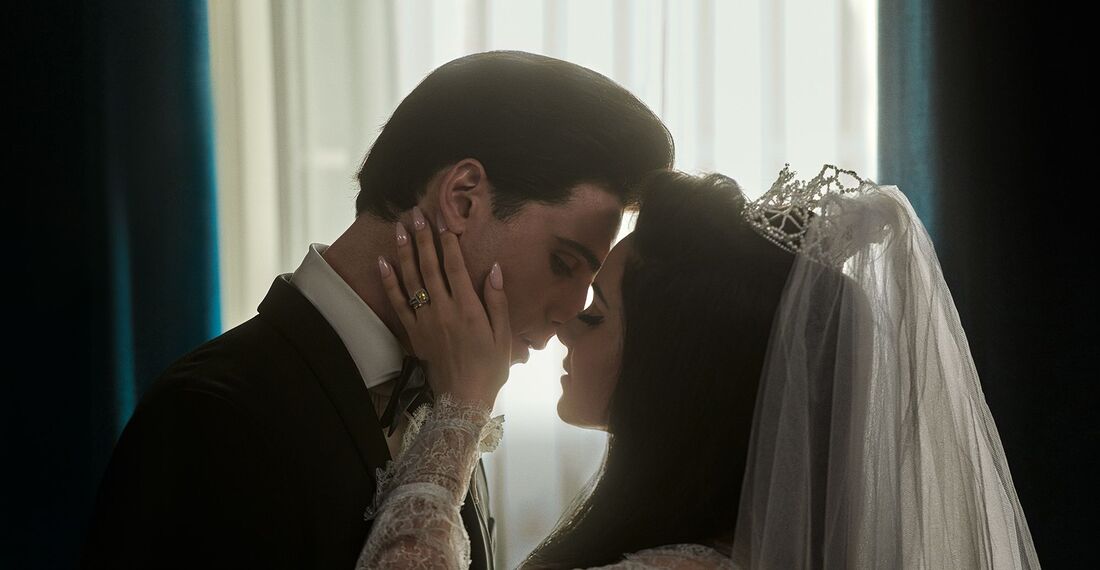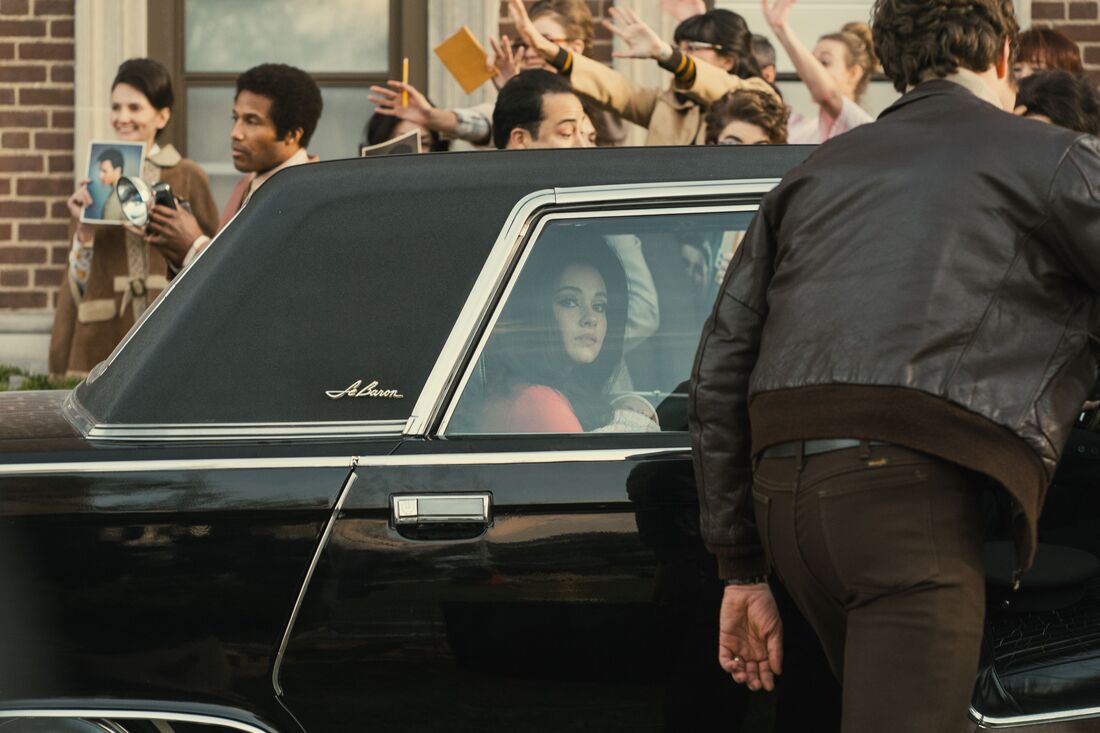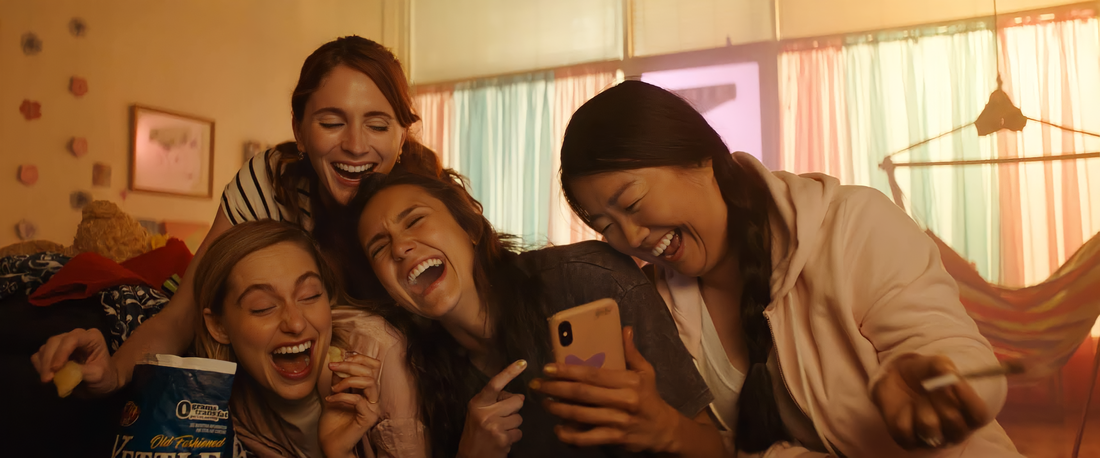|
Review by Joseph Fayed Did you know that AI could be evil? But I'm not talking about AI being used for sinister purposes; I mean artificial intelligence becoming its own supervillain. T.I.M. shows us how that is possible by stripping its script of any identity to separate itself within the good tech gone bad genre. The film follows Abi, an engineer who moves to the countryside with her husband, Mark, to work for a robotics company. She begins working on the company's latest project, T.I.M., which stands for Technologically Integrated Manservant. Trouble quickly arises when T.I.M. oversteps his boundaries and becomes obsessed with Abi, willing to do anything to please her. Cinema has yet to fully explore different ways to ground your film in reality when it's centered around the dangers of AI. A "serious" thriller should be capable of producing just that. Unfortunately, its human characters and their issues with each other aren't compelling enough for any sort of narrative. Our main couple, Abi and Mark, have experienced a marital crisis. But that's the most we learn about either of them. For T.I.M. to make his way into their lives, not much has to happen for him to grasp how Abi and Mark are so divided. It makes the plot have incredibly low stakes because you know precisely how T.I.M. will use their relationship against them. The performances from our three leads ranged from average to community theater. Eamon Farren captures the stoic essence of T.I.M. quite well based solely on his one facial expression. His mannerisms are just like how the other actors move, though, so I'll give him props for taking direction and not going overboard with a stiff performance. Georgina Campbell and Mark Rowley can't convincedly have tension. They act as if the rift between them is over misplaced car keys. Their lack of trust doesn't make up for Abi and Mark suffering from a lack of personality. T.I.M. himself can't even carry the heavyweight because he's too infatuated with a bland protagonist.
T.I.M. is a poorly made attempt to cash in on the fears many have with AI. If they wanted to explore that successfully, they could have easily leaned into dark comedy and created another M3GAN or, as Disney Channel OGs recall, Smart House. The last shot seemingly rips off the ending of M3GAN, too, but without the same iconic build-up. What makes those films better is they know how to pit humans and AI against each other creatively. The repeated tropes make the plot boring and don't add any excitement. Maybe the biggest fear society should have about technology is when lazy screenwriters use ChatGPT prompts to get their work greenlit. T.I,M. hits VOD on January 12. Rating: 1/5
0 Comments
Review by Joseph Fayed You Can't Stay Here seemingly has everything it needs to be a decent cat-and-mouse thriller. It is loosely based on a gruesome real-life murder and has its protagonist face various threats that could be very compelling to watch. Unfortunately, all the fixins provided here suffer from a lackluster script and poor acting that don't bring the range or depth this film desperately needs. Rick (Guillermo Diaz) is an aspiring photographer living in New York City in the early 1990s. Rick, a gay man, likes to take photos in Central Park. He frequently, although discretely, takes pictures of other gay men hooking up in the park. One day, Rick witnesses a brutal murder and finds himself being closely followed by a gay serial killer. Unsure of who to tell, Rick winds up a part of a subculture he only knew from afar, one that he might not be able to escape. Set against the backdrop of the AIDS crisis, the film doesn't have to do much to make it clear why our protagonist, Rick, would be living in fear. However, the film's biggest fault is making its antagonist — and its supporting characters — seem so unrealistic. You can't help but not care to root for Rick because the enemy is simply absurd. There is nothing sexy about this cat-and-mouse game either, which is what the film was clearly aiming for, but it feels almost PG-13 at times, even when there is meant to be something as risque as hooking up in public places. I will give credit where it's due; some portions of the film are unintentionally hilarious. It doesn't delve into camp territory, though, because most of it sucks. The poor acting isn't over the top, as it falls flat. Guillermo Diaz struggles in his leading role, giving a performance that feels like it belongs in a Pornhub Original. The line delivery from every actor is generally bad, and it almost feels like it could've worked had they gone for a Gregg Araki type of dark comedy where humor counters the serious tone.
From a technical standpoint, the cinematography is a victim of not raising enough funds on Indiegogo to finance something that doesn't look like a Funny or Die skit from the early 2010s. The film also bizarrely cuts from scenes into dream sequences more times than was needed. None of it deepens the mystery, and it actually puts a pause on the cat-and-mouse game we are supposed to follow. The script also severely limits any thoughtful dialogue about gay sex and connection that lonely Rick seeks, outside of what sounds like a transcript of direct messages on Grindr. When it's not trying to focus on the gay male gaze, You Can't Stay Here is held back by uninspired performances and lazy writing. It's not particularly sexy or thrilling, which tend to be the two biggest selling points in queer drama these days. American Horror Story: NYC has a similar premise with its own issues, but it still has more to offer than this does. This film is just like a bad hookup: you can't wait for it to be over. You Can't Stay Here hits theaters on January 5. Rating: 1.5/5 Review by Joseph Fayed Shot in a style considered unconventional given its subject matter, The Zone of Interest is as eerie as it's intended to be. The realism on screen isn't just a reflection of the film's setting; its social cues prove to be the most haunting of all. After a decade hiatus from feature filmmaking, Director Jonathan Glazer intrinsically captures a beautiful nightmare. Rudolf Hoss is the commander of Auschwitz. In 1943, he lives next door to the camp with his wife Hedwig and their children. They live in a two-story house with a well-kept garden and pool attached to it. The film follows how Rudolf and Hedwig strive to be the perfect nuclear family despite the evil they were actively engaging in just beyond the wall that separates them from the horrors of Auschwitz. It is gratifying to see a story about the Holocaust told with less of an emphasis on violence. While it is a true story, there is only so much trauma porn a viewer can handle to move the plot forward. It begins to feel purely done for shock value. This film is a prime example of how you can tell a story about brutality without showcasing it on screen. The lack of apparent drama is the most intriguing part. The blend of quieter moments mainly focuses on the family aspect while never downplaying the horrors next door. There are two different films here, one that is seen and the other that is heard. Through exploring the family dynamic, there is a much-needed sense of normalcy at times. The lead performances from Christian Friedel and Sandra Hüller keep the film very grounded. Neither attempts to upstage each other through their acting. Both of them are similar in terms of character arcs, with their line delivery being dependent on their abilities to be such reserved characters who are also extremely cold-hearted individuals.
The cinematography by Lukasz Zal is an impressive feat, too. The shots established throughout the Hoss family home require few cutaway shots or two shots, making you feel invested in these characters' every move. A particular scene set in the evening, shot with infrared cameras, temporarily takes you out of the colorful palette. The score by Mica Levi is just as haunting, used most effectively to break the film into different acts. Jonathan Glazer's direction proves that all of his movies so far have captured a different tone and let the performances speak for themselves. The actors get to act naturally, which is the cleverest trick for capturing the banality of evil. The Zone of Interest teaches you about history without needing to explain any of it. Impressive filmmaking and impressive performances will carry this film to success come awards season. The creative choices were made with the fact that these were real people in mind and how, by being who they were, they were effectively living a double life. The Zone of Interest opens in theaters on December 15. Rating: 4/5 Review by Joseph Fayed A story built upon the foundation of a certain historical period is far more difficult to convey than a story set during a specific time period. Peacock, a South African gothic horror, blurs its lines between past and present, and the results are a mixed bag. After being dismissed from her school, Anna is sent to be the caretaker for an elderly man, Sarel Cilliers, on his remote farm. As soon as Anna settles in, Sarel begins going on bizarre rants and has disturbing visions and hallucinations. Sarel's behavior leads Anna to think something deeper lies within the farm and how it ties into her own past. This type of gothic horror is inherently lazy. Sarel's hallucinations look like they were filmed as part of a Children of the Corn sequel. Low budget aside, it was clear that the "threat" was nothing more than a poor horror trope rather than something that could have tied in with South African folklore. I thought the landscape was underutilized, too. While I think there's more to explore in horror than a setting like a haunted house, a remote setting is meant to be bleak and isolating. Without that, Sarel comes across as just a kooky old man who lives alone. Tarryn Wyngaard's performance as Anna was perfectly distraught and carries the film. Her expressions can really capture both timid nature and exhaustion quite well. She had me convinced she despised watching over Sarel, as I would too. However, Anna's backstory is woefully underdeveloped. The single significant event from her past isn't fleshed out enough to better understand where she comes from. This is most noticeable when she befriends another character named Jean. Her encounter with Jean feels out of place and very rushed. There is a notable lack of chemistry between Anna and Jean during his brief screen time. This placement in the final act sticks out like a sore thumb because intimacy was clearly not fathomable between those two.
Peacock is a gothic horror with a neat color palette behind its cinematography. The story simply isn't scary enough to justify its existence. It can't decide what fears it wants to expose its viewers to. Impressive acting feels wasted on a script that isn't very subtle about what secrets are being kept from its audience. This genre of horror tends to try to elevate itself above the rest of horror because it relies on being "bleak," but this film is no different than a lackluster haunted house-themed popcorn pleaser. The only difference is box office results. The scare tactics in this get old really fast, and any pretty peacock with its beautiful feathers shown on screen can't prevent the film from being too barren even for its gothic backdrop. Peacock is now streaming on IndiePix Unlimited. Rating: 1/5 Review by Joseph Fayed The plight of an immigrant could easily be nightmare fuel. Raging Grace is Director Paris Zarcilla's SXSW award-winning debut that tells the story of one immigrant that takes a sinister turn but also mostly follows familiar horror tropes that leave its antagonists and its ultimate message not as terrifying as they were meant to be. Joy is an undocumented Filipina immigrant trying to secure a better life for herself and her young daughter, Grace. When she lands a job as a caretaker that she simply can't refuse, she soon discovers a grisly secret about her employer that could jeopardize their lives. Without wanting to play into stereotypes, the film handles its characterization of Joy well. Joy is very determined and, under her circumstances, does not buckle under whatever is thrown at her. Her arc revolves around respect from those who feel she has invaded their environment, and she consistently stands on her own two feet to demand that. Developing such strength for a character midway through would have been difficult for a protagonist meant to have endured the worst throughout her life. Shedding off her past so suddenly would have been too confusing. On the other hand, Joy's employers, Katherine and Mr. Garrett, both embody prejudice, which manages to contrast each other at times, but it's done to a laughable extent. Katherine is more upfront about hers, and the terminally ill Mr. Garrett slowly reels you in with his. Any moment a character is supposed to feel angry is unintentionally hilarious. At one point Katherine has something that I can only describe as a Marty Wolf from Big Fat Liar-esque meltdown. This immediately turns into a serious confrontation between her and Mr. Garrett without addressing what just happened that led to said meltdown. This occurs just before the reveal of what exactly Katherine and Mr. Garrett have been hiding from Joy and Grace. The reveal isn't much of a mystery, as any clues on what may be hidden are kept until the third act, which is also when almost anything significant happens. This does not include a memorable sequence towards the end that is clearly meant to be paranormal, set up like a parody of Insidious.
Tonally and pacing-wise, Raging Grace is very messy. You will be engaged with the plot at times, but for all the wrong reasons. Its performances delve into camp territory, which ironically becomes the most memorable aspect of any of this. If you're expecting to explore the inner demons of a wealthy family and how their immigrant housekeeper is driven insane by them, you're expecting too much to be adequately fleshed out. This psychological thriller will only leave you second-guessing how this won over the grand jury at SXSW. In the meantime, go watch Nanny by Nikyatu Jusu for a better tale about an immigrant wanting to help her child, which comes at the cost of disturbing breaks from reality and heartbreak. Rating: 2/5 Review by Joseph Fayed The most intimate documentaries are ones filmed by those with a personal connection to the subject. Director Rea Tajiri has discussed at length her family's experiences in Japanese Internment camps in her previous work; now, she is focusing specifically on her mother. Wisdom Gone Wild takes her mom's story and the harsh truths of it and balances it perfectly with lighthearted moments. Rose Tajiri, mother of filmmaker Rea, is nearing the end of her life and is suffering from dementia. Compiled using various home videos from different time periods, the documentary paints Rose's spirit as one that won't wither away, no matter how dementia affects her. Rose's condition makes some of the retelling of her life somewhat ambiguous. Rea herself bridges that gap with key insight into the details of her mother's life. It allows us to explore her later years while also understanding the parallels to her mom's upbringing and how it has impacted Rea's relationship with her. However, in a sad twist of fate, Rea's role is extended to being a primary caretaker of her mom and essentially becoming her parent's parent. There are very few cutaways throughout the documentary, so you are seeing long sequences of her mother succumbing to her dementia. Rose's wisdom is sprinkled throughout her daily life, so nothing feels traumatic just for the sake of showing a chronic illness. Many events in Rose's life are alluded to shaping her identity; her memories are not succinct, but there is enough story to build from them. Rea is the conversationalist who is able to get her mom to answer how she feels in her state. Rea is non-judgmental while she allows Rose to showcase her raw feelings. There is something comforting about the platform Rea opened up for her frail mother. The main themes in this are fear and inner strength being portrayed, and they're both fairly balanced. Part of this comes from the lack of historical context addressed. Not going into detail about the mistreatment Japanese Americans faced during World War II gives deeper meaning to Rose's memories. Why and how she could be the way she is are explained through Rose trying to reinvent herself — consistent throughout the film's narrative.
Wisdom Gone Wild features an unintentionally unreliable narrator and her daughter, who make for a beautiful story. This isn't a tale of dementia, as it tells you more about the passage of time and how it affects us. Sometimes, we forget what has happened; sometimes, we atone for our past or embrace it. Rose does all three as her mind enters a new state. She has accepted her new reality with as much ease as one can. We can all agree that she has a loving daughter by her side who handles her story with grace. Wisdom Gone Wild airs on POV on November 20. Rating: 4/5 Review by Joseph Fayed Claudia Alta Johnson, better known as "Lady Bird," was First Lady of the United States from 1963 to 1969. These years are explored in Dawn Porter's new documentary The Lady Bird Diaries. Told firsthand by Lady Bird herself, the documentary is very poignant at times, but falls far from being groundbreaking in any way. Lady Bird Johnson recorded over 100 hours worth of audio passages while she was First Lady. Many of these recordings have not been made public until now. Combined with archive footage and photographs, the documentary pulls back the curtain on the woman caught in the midst of one of the most tumultuous eras in American history. This intimate approach should be attempted by more documentaries, especially those where the subjects are deceased. The lack of talking heads featured grips you in because it feels you have access to Lady Bird reading her own diary or something similar. Lady Bird herself kept a well crafted image throughout her life, and that remains true in her speech. There is no mic drop moment spoken by her, yet she doesn't shy away from sharing her emotions she — and many other women — are often told to refrain from showcasing. One complaint is that it felt like there were noticeable gaps in the timeline Lady Bird was in the White House. While still covering crucial events, the years of 1964-67 are placed on the back burner, while the beginning and end of LBJ's presidency are highlighted. There still is enough to cover in 110 minutes, notably the Vietnam War, which decreased LBJ's popularity in the polls significantly. The most interesting parts of the film were hearing what Lady Bird thought of war protestors. Here, she is no longer in her husband's shadow, but in the spotlight when asked about Vietnam. She and her husband met great resistance during this period, such as when Eartha Kitt famously questioned the two at a White House luncheon. Ultimately, Porter expresses through the recordings that being vocal is the best way to fight for what you believe is right. Lady Bird, however, was pressured to do the opposite in her position.
The Lady Bird Diaries captures textbook history on the era of the Johnsons, and how they went from heavily favored to the masses turning on them. There's no new intel presented on why they lost a second term. What we do get is a closer look at someone who wasn't expected to address the nation every day, but was expected to be as polished and prepared as any politician. While she didn't have the same powers her husband had, Lady Bird had her own moral convictions, which she stood by through it all. The Lady Bird Diaries is now streaming on Hulu. Rating: 3.5/5 Review by Joseph Fayed The Marsh King's Daughter is an adaptation of the 2017 novel of the same name. Acclaimed for its suspense, the film had high standards to achieve. Unfortunately, it is adapted into something tedious and not distinctive enough to set itself apart from the plethora of psychological thrillers that don't have their own source material. A man known as the Marsh King (Ben Mendelsohn) has been holding Helena (Daisy Ridley) and her mother captive for Helena's entire childhood. They lived off the grid until they managed to escape. Now as an adult with a child of her own, Helena is horrified to discover that the Marsh King has escaped prison. She assures herself that she will do anything to prevent him from inflicting more pain on her or carrying it over to her daughter. If the screenplay is any indication, the novel itself must be airport bookstore quality. The biggest problem is that Helena is simply unremarkable as a protagonist. While her actions directly impact the story, Helena lacks any sort of appeal to make her a character leading a film. Her past is laid out for the viewers in the opening sequence, and from there, nothing she does directly unearths anything we didn't already learn about her time with the Marsh King. There isn't even an in-depth look at how she processes her feelings either. While nothing can top the "cool girl" monologue from Gone Girl, something of that liken would have made up for the lack of anything. Daisy Ridley tries her hardest with what she's been given to work with, but to no avail. Her character feels very lost with the trauma she has dealt with. That doesn't mean she has to experience an everlasting anxiety attack, but a more nuanced approach would've been appreciated during the build up to her and the Marsh King being reunited at long last. Ben Mendelsohn plays his creepy character with as much conviction as any other creep who lives in the woods. As a separate entity, what little we see of him carries the film forward. The interactions between the two leads, both as adults, drag the film forward. In terms of pacing, this is why it would've been a smart move to scatter the flashbacks of Helena as a child throughout the film, as it could have benefited from a tonal shift heavily.
The Marsh King's Daughter was beaten to the screen by another wildly successful literary adaptation last year with Where the Crawdads Sing. Daisy Ridley won't be generating the same buzz Daisy Edgar Jones did for her role in the latter. This poorly-paced misfire tries to check off every cliche it can before it reaches its unsatisfactory conclusion, which feels more like the season finale of a network police drama that is only still on the air because it is popular with the over-50 demographic. Perhaps this screenplay needed more insight from the author herself, or maybe it should have kept its previous fate as an overpriced novel you read while sitting in an airport terminal. The Marsh King's Daughter hits theaters on November 3. Rating: 1/5 Review by Joseph Fayed Priscilla is the latest Sofia Coppola feature to have a female protagonist trapped in the ever so isolating lifestyle of the rich and famous. This time she tells the story of Priscilla Presley, and using a similar formula as she has in the past, Coppola keeps you engaged in this slow burn of a biopic. When she was 15 years old, living on a military base in Germany with her family, Priscilla Beaulieu (Cailee Spaeny) met 25 year old Elvis Presley (Jacob Elordi). The film follows the next decade of their relationship, and how Priscilla became inserted into a world she knew absolutely nothing about. As her life changes, Priscilla must decide what she wants, while also considering the impact on her world famous husband and how easily their lives can fall apart. The film is told largely from the perspective of Priscilla and gives her more agency in several ways — for, example, by not including Elvis music (even if part of the reason is that the production was not granted permission to include his songs). Elvis was heavily focused on his career and is absent for a significant portion of the film. Priscilla, in the meantime, must come to terms with her new surroundings. She explores her new reality like any other teenager would have. The most sensationalized aspect of the relationship between Elvis and Priscilla was their significant age gap. Unlike Elvis, where this detail was seemingly overlooked, Sofia Coppola dares to plant the seed that the king of rock and roll may have been at fault here. There are moments in the film where Elvis lashes out at Priscilla and gets violent with her. His team — with whom he spends more time on the road than he does with Priscilla — acts as yes men and doesn't disapprove of his actions. The downfall of their relationship isn't painted as some takedown of Elvis, but a growing discontent on behalf of Priscilla. It is obvious that she, like many other celebrity marriages, lost touch with her happiness once the honeymoon phase of their relationship was over. What followed was suffering in silence... something that the claustrophobic nature of the film captures beautifully.
Coppola is at her A-game once again when it comes to cinematography and set design. It's hard to describe how intimate shots are set up when they focus specifically on Elvis and Priscilla, versus the wide angle shots that almost hide our characters in a backdrop of pastel colors. Cailee Spaeny and Jacob Elordi have great chemistry with each other and don't try to outact each other by impersonating Priscilla or Elvis. They look and sound like their characters, without having to go into theatrics to prove their transformation. Priscilla mostly avoids falling into familiar tropes that tend to tank biopics. Given that this one was produced by Priscilla herself, she was clearly able to give her say in the matter. Whether it's the accusations of Elvis grooming her or his own infidelity, nothing serves as a dramatic turn of events until the marriage dissolves. The need to reclaim oneself doesn't happen after a particular sequence of events, and thankfully, the film doesn't act like the story needs to be told that way. It isn't flashy like Elvis was, nor does it focus on making a star a star. Rather, it settles for an intimate portrait of the woman who was by his side for so many years. The lonesome tone of this may be off-putting to some, but as an outsider looking into this relationship, it feels like the film consistently covers how Priscilla always felt she was on the outs too. At least Priscilla was able to find comfort in her bottle of Chanel No. 5 perfume, as would I. Priscilla is now playing in theaters. Rating: 5/5 Review by Joseph Fayed More than three years after production wrapped, Sick Girl starring Nina Dobrev has finally been released. Picked up for distribution by Lionsgate, the quality of humor and lack of comedic timing or decent performances make it surprising to learn this wasn't a shelved Netflix original film. The film follows Wren Pepper (Nina Dobrev), who feels like she is growing apart from her best friends. In the midst of a personal crisis, she lies to her friends, telling them that she has cancer. Wren's friends decide they need to step up their support of the newly "sick" Wren, and her lie starts to spiral out of control from there. This comedy about a little white lie would have been elevated if it was a satire on cancer and the gatekeeping — or lies in Wren's case — around it. Instead, what we get is the misadventures of Wren. While Wren tries to carry on with her life, she still acts as normal as possible. There is no tonal shift in her personality, which wasn't very interesting to begin with, mind you. The biggest reactionary moments feature Wren's tight-knit friend group. Ironically, her friends aren't too discernible from each other. But that is what makes Wren stand out from the shadow of being a plain protagonist. While most of the film follows Wren carrying on with her lie, the supporting cast, who are meant to bear the weight of Wren's journey along with her, give bad performances too. The characters are so one-dimensional you learn next to nothing about the personal stakes this had on them. Beyond their friendship to Wren, their character arcs aren't expanded. Wren being a selfish individual who would tell such a lie should give the script leeway into exploring how her friendships reached the crossroads they did in the first place, and why they continue to have such an emotional bond towards her. The acting chops of the cast also feel bland, and their line delivery — even during humorous moments — felt off. Comedic timing is an underappreciated skill that none of the actors had to carry this film.
Sick Girl doesn't have an interesting enough protagonist to make up such a bold lie. It is a missed opportunity to explore the inner workings of someone who fools everyone around her, or how a community deals with a sensitive issue like cancer. It's not particularly funny, either, as its humor feels recycled from a million comedies in the past. Maybe with a better cast and crew, this could have been a dark satire that didn't hold back in how ridiculous those in a rather serious situation tend to act. Sadly, all hopes for that are just wishful thinking for a film that feels like it would've been one of the top 10 movies on Netflix for a week before it's collectively forgotten. Sick Girl hits theaters and VOD on October 20. Rating: 1/5 |
Archives
April 2024
Authors
All
|
|
|
disappointment media
Dedicated to unique and diverse perspectives on cinema! |

